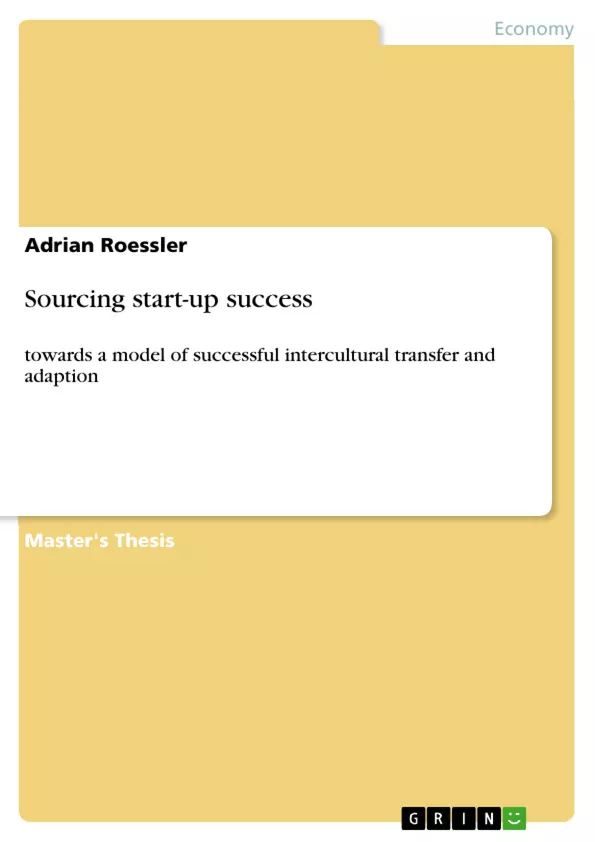
Sourcing start-up success
Masterarbeit, 2011
137 Seiten, Note: A
Leseprobe
Inhaltsverzeichnis (Table of Contents)
- Introduction
- Aim of the paper
- Structure of the paper
- Methodology and sourcing of information
- Tapping the global farm for business ideas
- Influence of globalization
- Influence of the Internet
- Imitation and copycatting
- Success factors of start-ups
- The business model
- Business planning
- The team as key asset
- The power of the network
- Funding as growth driver
- The cultural environment
- Hofstede's cultural dimensions
- Cultural differences and their effect on start-ups
- The institutional environment
- The effect of the institutional context on success factors
- Legal issues as a stumbling block
- Case study: the daily deal mania
- The couponing market pre Groupon
- The new business model
- The hype starts
- The European clone wars
- Big money for fast scaling
- Groupon's shopping spree and outlook
- Case study part 2: adaption difficulties
- Institutional context
- The cultural context
- Developing the model
Zielsetzung und Themenschwerpunkte (Objectives and Key Themes)
This paper investigates the success factors of start-ups, particularly those based on new business models that have gained traction through global impact and the influence of the internet. The paper examines the role of cultural and institutional environments in facilitating or hindering the transfer and adaptation of successful start-up models across borders. It explores the interplay between the success factors of start-ups and the specific challenges of cultural and institutional contexts, using the example of the "daily deal mania" to illustrate these dynamics.
- Success factors of start-ups
- The role of the cultural environment in start-up success
- The influence of the institutional environment on start-up success
- The transfer and adaptation of start-up models across borders
- The impact of globalization and the internet on start-up ecosystems
Zusammenfassung der Kapitel (Chapter Summaries)
The introduction sets the stage by highlighting the rise of successful web-based start-ups and emphasizing the importance of understanding their success factors. Chapter 2 explores the broader context of globalization and the internet's impact on the emergence of new business models. Chapter 3 delves into key success factors of start-ups, encompassing aspects like the business model, planning, team composition, networking, and funding.
Chapter 4 examines the cultural environment, focusing on Hofstede's cultural dimensions and their implications for start-up success. Chapter 5 delves into the institutional environment, exploring how legal frameworks and regulations can impact the success factors identified earlier.
Chapter 6 presents a case study of the daily deal mania, tracing the evolution of the couponing market, the rise of Groupon, and its global expansion. Chapter 7 delves into the adaption difficulties encountered when transferring the daily deal model to different cultural and institutional contexts.
While the conclusion is excluded from this preview, it's likely to synthesize the insights gathered from the previous chapters and offer a comprehensive model for understanding the successful transfer and adaptation of start-up models across borders.
Schlüsselwörter (Keywords)
The key concepts explored in this paper revolve around start-up success, intercultural transfer, and adaptation of business models. The paper draws upon research on globalization, the influence of the internet, cultural dimensions, and institutional environments. It investigates the role of success factors like business models, planning, team composition, networking, and funding in the context of cultural and institutional contexts. Furthermore, the paper uses the case study of the "daily deal mania" to illustrate the complexities of transferring and adapting successful start-up models across borders.
Details
- Titel
- Sourcing start-up success
- Untertitel
- towards a model of successful intercultural transfer and adaption
- Hochschule
- Wirtschaftsuniversität Wien
- Note
- A
- Autor
- Adrian Roessler (Autor:in)
- Erscheinungsjahr
- 2011
- Seiten
- 137
- Katalognummer
- V177782
- ISBN (eBook)
- 9783640996247
- Dateigröße
- 1519 KB
- Sprache
- Englisch
- Schlagworte
- start-up ecommerce couponing intercultural internationalization
- Produktsicherheit
- GRIN Publishing GmbH
- Preis (Ebook)
- US$ 39,99
- Arbeit zitieren
- Adrian Roessler (Autor:in), 2011, Sourcing start-up success, München, Page::Imprint:: GRINVerlagOHG, https://www.diplomarbeiten24.de/document/177782
- Autor werden
- Ihre Optionen
- Vertriebskanäle
- Premium Services
- Autorenprofil
- Textarten und Formate
- Services für Verlage, Hochschulen, Unternehmen

- © GRIN Publishing GmbH.
- Alle Inhalte urheberrechtlich geschützt. Kopieren und verbreiten untersagt.
- info@grin.com
- AGB
- Open Publishing
Der GRIN Verlag hat sich seit 1998 auf die Veröffentlichung akademischer eBooks und Bücher spezialisiert. Der GRIN Verlag steht damit als erstes Unternehmen für User Generated Quality Content. Die Verlagsseiten GRIN.com, Hausarbeiten.de und Diplomarbeiten24 bieten für Hochschullehrer, Absolventen und Studenten die ideale Plattform, wissenschaftliche Texte wie Hausarbeiten, Referate, Bachelorarbeiten, Masterarbeiten, Diplomarbeiten, Dissertationen und wissenschaftliche Aufsätze einem breiten Publikum zu präsentieren.
Kostenfreie Veröffentlichung: Hausarbeit, Bachelorarbeit, Diplomarbeit, Dissertation, Masterarbeit, Interpretation oder Referat jetzt veröffentlichen!
- GRIN Verlag GmbH
-
- Nymphenburger Str. 86
- 80636
- Munich, Deutschland
- +49 89-550559-0
- +49 89-550559-10
- info@grin.com
-









